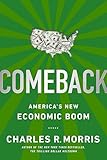Comeback : America's new economic boom / Charles R. Morris.
Material type: TextPublisher: New York : PublicAffairs, [2013]Edition: First editionDescription: x, 179 pages : illustrations ; 21 cmContent type:
TextPublisher: New York : PublicAffairs, [2013]Edition: First editionDescription: x, 179 pages : illustrations ; 21 cmContent type: - text
- unmediated
- volume
- 9781610393362 (pbk.)
- 1610393368 (pbk.)
- Economic forecasting -- United States
- United States -- Economic conditions -- 2009-
- Energy industries -- United States
- Industrial policy -- United States
- Pronóstico de la economía
- Política industrial -- Estados Unidos
- Primera Jornada de Catologacion
- Industria energética -- Estados Unidos
- Crisis financiera -- Estados Unido
- Sistema financiero -- Estados Unidos
- 332.7
- HC 106.84 M875c 2013
| Item type | Current library | Home library | Collection | Shelving location | Call number | Vol info | Copy number | Status | Date due | Barcode |
|---|---|---|---|---|---|---|---|---|---|---|
 Libro
Libro
|
Biblioteca Juan Bosch | Biblioteca Juan Bosch | Ciencias Sociales | Ciencias Sociales (3er. Piso) | HC 106.84 M875c 2013 (Browse shelf(Opens below)) | 1 | 1 | Available | 00000108672 |
Browsing Biblioteca Juan Bosch shelves, Shelving location: Ciencias Sociales (3er. Piso), Collection: Ciencias Sociales Close shelf browser (Hides shelf browser)

|

|

|

|

|

|

|
||
| HC 106.84 M361t 2011 The trillion-dollar conspiracy : how the new world order, man-made diseases, and zombie banks are destroying America / | HC 106.84 M478p 2016 People get ready : the fight against a jobless economy and a citizenless democracy / | HC 106.84 M824t 2018 Trumponomics : inside the America first plan to revive our economy / | HC 106.84 M875c 2013 Comeback : America's new economic boom / | HC 106.84 M996n 2016 The new grand strategy : restoring America's prosperity, security, and sustainability in the 21st century / | HC 106.84 N135s 2012 The seventeen solutions : bold ideas for our American future / | HC 106.84 O66b 2023 The big myth : how American business taught us to loathe government and love the free market / |
Includes bibliographical references (pages 159-170) and index.
The manufacturing/energy nexus. Shale country ; An unconventional revolution ; The return of the whales ; The dark side and how to deal with it -- The rest of the economy. Cycles ; Rebuilding America ; Cognitive dissonance ; WrapUp.
The author's The Trillion Dollar Meltdown (2008) warned of the impending financial crash in all its horrific scale and speed. Now, he reveals that the United States is on the brink of a strong recovery from the 2008 global financial crisis that could last for twenty years or more, claiming that such booming new industries as shale-based oil will generate millions of new jobs and tame inherited deficits. The great economic boom times in American history have come because of fortuitous discoveries. Natural resources (coal first, then oil) fueled vast economic and industrial expansions, which in turn helped create and supply new markets. The last genuine economic game changer was the technology boom of the 1990s, which gave the U.S. a global competitive advantage for a while based on electronics and silicon. The author was one of the first writers and analysts in the U.S. to predict that the tech boom would lead to a period of sustained economic growth. In defiance of the recessionary times (in 1990), he saw the coming boom. Now, in 2013, he sees the threshold of another. This time the gift is natural gas. The amount and distribution of gas in American shale is so vast that it has the potential to transform the manufacturing economy, creating jobs across the country, and requiring a new infrastructure that will benefit the nation as a whole. Because of fracking, jobs that once would have been outsourced abroad will return home, America can become a net exporter of energy, and cheap energy will provide the opportunity for innovation and competition. In light of this new opportunity, and other complementary developments the author explores in this book, the U.S. ought to be approaching the future with a robust self-confidence it has not experienced in a while. But we could fumble it away. The gold-rush style of shale boom companies does not make them good neighbors. A counter-reaction could put their industry, and the new era of national prosperity, at risk. We also have a political system that has the capacity to spoil the benefits of this huge boon. If the wealth locked in the continental shelf is not shared for the general economic good, but is instead exploited in short-term profiteering, then many of the opportunities that exist will be choked off by a few very rich corporations. Managing the great bonus of the vast store of cheap energy is going to become a defining political challenge in the years ahead.


There are no comments on this title.